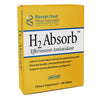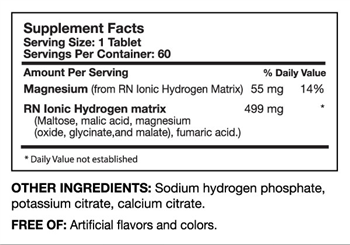H2 Absorb
$42.00 $60.00
The healthy body creates free radicals as a result of normal activity & metabolism. These free radicals, known as ROS (reactive oxygen species) or RNS (reactive nitrogen species) are kept in check by the healthy body, maintaining normal mitochondrial function and minimizing oxidative stress.
Healthy and unhealthy individuals create oxidative stress. Exercise increases a person’s use of oxygen, and increases the work load on the mitochondria. As a result, professional athletes create higher oxidative stress (free radical activity) levels than those who do not exercise to the same extreme. Those facing health challenges may promote a less than optimal level of oxidative stress. The point is that oxidative stress occurs on an ongoing basis and for a variety of reasons.
Oxidative Stress Management1*
Aging and age-related diseases reflect the inability of our antioxidant defenses to cope with oxidative stress over time. Strong antioxidant defenses (endogenous & exogenous) are correlated with a healthier life1.*
Some Free Radicals (Oxidants) Are Good
It is important to note that not all oxidants are bad. We need oxidants such as nitric oxide to support our vascular system. We need oxidants for healthy cell signaling (intercellular communication). Phagocytes (special immune cells) deliberately release free radicals as a part of their chemical cocktail to kill & digest bacteria & viruses2
Under normal physiological conditions ROS/RNS exist at low cell concentrations that do not cause excessive cellular damage3.
Hydrogen Gas: A Selective Antioxidant*
New research has shown that Molecular Hydrogen (two atoms of hydrogen combined into one molecule – H2) is a powerful antioxidant that selectively targets the most toxic of free radicals*, the hydroxyl group4. The ability to selectively target free radicals is important as it means that it will not interfere with adjunctive therapies doctors may be pursuing. Unique features of hydrogen gas include its ability to:
- selectively neutralize bad free radicals, including the hydroxyl radical4*
- diffuse across membranes, including mitochondria, due to its small size5*
- effectively penetrate biomembranes and infiltrate into organelles, such as mitochondria and the cell’s nucleus3*
- to penetrate the blood-brain barrier (in contrast to most antioxidants)3*
- dissolve in water and not change intracellular acidity, taste, color or any characteristics of water3
- once ingested, hydrogen-infused water passes quickly into the blood and throughout the body3*
- promote healthy lactic acid levels and post-exercise recovery in athletes3*
- support healthy inflammation levels3*
Published Research
Since 2007, there have been over 80 significant published research studies3:
- Hydrogen Gas – 21 published studies
- Hydrogen via Saline Injections – 27 published studies
- Hydrogen Water – 23 published studies
According to Garth Nicolson, PhD, “there are now a critical number of scientific and clinical studies that support the use of hydrogen as a primary or supportive component of clinical care”.





Share this item: